Iran Says Ready For Military Exercises With 'Friends And Allies'
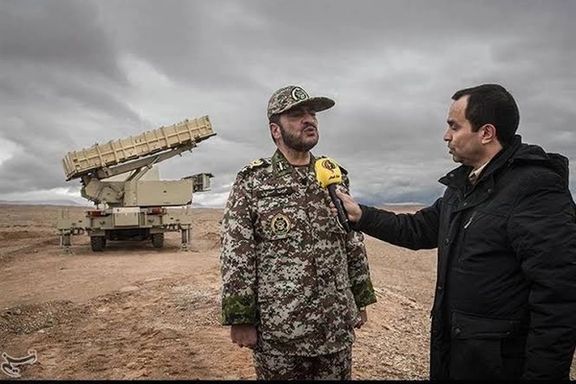
Iran’s Commander of the Army Air Defense Force has declared the readiness to engage in cooperative military activities with "friendly and allied" countries.

Iran’s Commander of the Army Air Defense Force has declared the readiness to engage in cooperative military activities with "friendly and allied" countries.
During a meeting of foreign military attaches stationed in Tehran, Brigadier General Alireza Sabahifard said that Iran is prepared to expand various forms of military cooperation, which include planning joint exercises and exchanging technical and operational expertise, as well as holding regular bilateral meetings.
As reported by the Fars News Agency, Sabahifard also emphasized the army’s need to exchange knowledge and experience with allies, as well as share new scientific developments and the strategic aims.
Prioritizing equipment reliability and operational performance enhancement, he disclosed ongoing efforts to carry out necessary maintenance and repairs, aligning with standard practices adopted by military forces around the world.
The announcement comes against the backdrop of heightened tensions in the region. In recent weeks, the United States has increased its military presence in response to Iran's actions aimed at disrupting maritime traffic in the Strait of Hormuz and the surrounding waters.
The Pentagon's response included the deployment of additional F-35 and F-16 fighter jets, along with a warship to the Middle East. These measures were taken to monitor crucial waterways in the region following Iran's seizure and harassment of commercial shipping vessels.
Incidents involving shipping in Persian Gulf waters have occurred since 2019 during times of escalated tensions between the United States and Iran. The Strait of Hormuz, through which approximately one-fifth of the world's crude oil and oil products pass, remains a strategically vital maritime choke point.
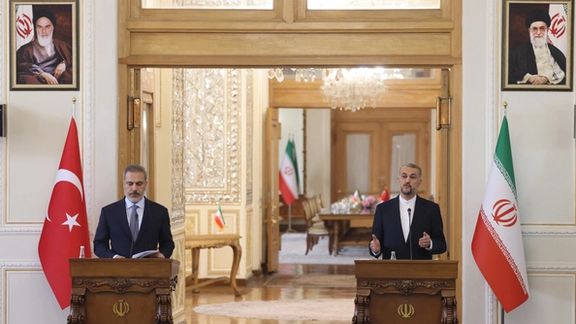
Iranian Foreign Minister Hossein Amir-Abdollahian met with his Turkish counterpart, Hakan Fidan, in Tehran to discuss the expansion of bilateral trade relations.
During the meeting, Amir-Abdollahian announced an ambitious goal of increasing trade between the two nations up to 30 billion euros.
The two foreign ministers reiterated their commitment to strengthening economic ties and agreed to sign a comprehensive agreement on trade cooperation.
Notably, during the presidency of Mahmoud Ahmadinejad, Iran and Turkey had previously agreed to increase bilateral trade to 30 billion dollars by 2016. However, recent official figures from Turkey reveal that the trade volume remains significantly lower, with total exports to Iran amounting to only 1.66 billion dollars in the first seven months of this year, and imports from Iran standing at 1.36 billion dollars.
Last year, the total bilateral trade between Iran and Turkey amounted to less than 6.4 billion dollars, underscoring the need for renewed efforts to achieve the ambitious trade target.
Meanwhile, Hakan Fidan, the Turkish Foreign Minister, emphasized the need for cooperation between Turkey and Syria in combating the Kurdish PKK group, recognized as a terrorist organization by Turkey, the European Union, and the United States. He called for increased collaboration between the Syrian government and Ankara on this issue.
Amir-Abdollahian echoed the importance of addressing Turkey and Syria's concerns related to terrorism, border security, and refugees through diplomatic dialogue, emphasizing respect for the sovereignty and territorial integrity of both countries.
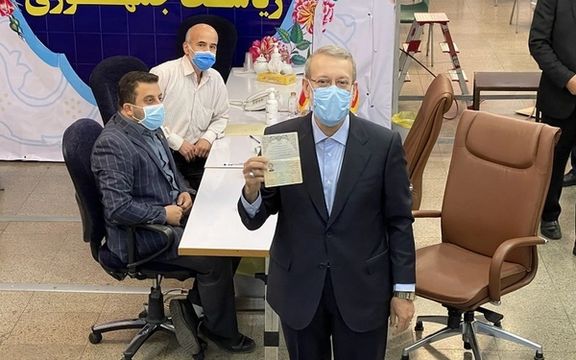
Some of Iran's high-profile politicians have spoken about the upcoming parliamentary elections in March 2024, albeit with a tone marked by bitterness.
Former parliamentary Speaker Ali Larijani made it clear in an interview with centrist website Entekhab that he is not going to run for parliament (Majles) in March. However, he said that he will explain his reasons for not taking part in the election at a later date.
Larijani's aides had said earlier that although he is not going to run himself, he will present a list of likeminded candidates including his brother-in-law, outspoken moderate conservative former lawmaker Ali Motahari who at times has even criticized Supreme Leader Ali Khamenei's policies.
Larijani who still harbors hard feelings about his disqualification in the 2021 Presidential election, criticized the current ultraconservative-dominated parliament and teasingly called its hardliner members "wheeling-dealing revolutionaries."
"They claim to be revolutionaries and they want to win all the positions in the government," Larijani said. He added that this group's presence in the Iranian politics dates back to the early days after the 1979 Islamic revolution. "They have always tried to create a bipolar situation and attempted to kick their political rivals out of the scene," he said.
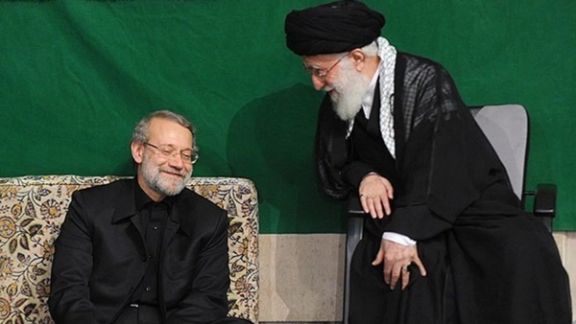
Larijani once again talked about his idea of political purification adding that this is a policy hardliners are advancing in order to ensure that others are excluded political competition and participation.
This purging, he said, will belittle the revolution and will inevitably lead to the disintegration and fragmentation of the nation.
However, Larijani charged that hardliners are furthering the idea of political purification to secure their personal and factional interests. They do not believe that positions of power should be held by individuals who have the right talent and capability for those posts.
Meanwhile, Khabar Online reported last week that Former President Mahmoud Ahmadinejad is also going to present a list of candidates for the Majles elections. However, according to the website, although Ahmadinejad and his aides will actively take part in presenting the list, their main objective is to secure a foothold for the 2025 Presidential election, when Ahmadinejad is hoping to have a political comeback.
For the Majles, Khabar Online wrote that Ahmadinejad's team may independently present a list of candidates for all the constituencies although they might decide at one point to come up with a shared list of candidates with one of the major conservative camps.
Like Larijani, Ahmadinejad has also tasted the bitter disqualification by Khamenei's Guardian Council in previous presidential elections. If they are ever allowed to run again, that would mean that Khamenei is desperate to have a high-turnout election.
In another development, conservative heavyweight Mohammad Reza Bahonar, who has repeatedly spoken with the media, warning about a low turnout, has once again lashed out at current lawmakers for their inefficiency, which he said has disappointed Iranian voters.
Bahonar, who like Larijani and Ahmadinejad, is a member of the expediency Council, said in an interview with Khabar Online that Khamenei usually issued an occasional warning about previous parliaments' performance, but he has warned the current parliament several times about various legislative matters.
Bahonar said that he has told Speaker Mohammad Bagher Ghalibaf that one of the main weaknesses of the current Majles is that it does not have a powerful minority faction. The lawmakers think they have no rivals and challenges ahead of them, and that they can do whatever they like.
Nonetheless, the Majles and the government are in a state of denial about almost everything. Vice President Mohammad Hosseini told the press on Friday that the previous government should be blamed for the low turnouts in recent elections, without presenting any evidence.

Owning a home in the Iranian capital Tehran has become virtually impossible while the key indicators of the quality of life are also in decline.
Iran's leading economic daily Donyaye Eqtesad (World of Economy) published an article Saturday listing a plethora of problems facing the residents of the capital.
The average time people needed to save money to be able to buy a residence in Tehran has increased to a staggering 112 years, from about 22 years in 2005. According to Donyaye Eqtesad, the period of time for those born since late 1990s -- the so-called generation Z -- is now estimated to be 200 years.
Economist Hassan Mansour told Iran International that the Housing Affordability Index is about four to 10 years in England, where housing prices are among the most expensive in the world. “This means there is no hope for Iranians to own a home,” he noted.
Last week, Mohsen Pirhadi, the vice-chairman of the parliamentary committee for Iran’s Seventh National Development Plan, said the government plans to reduce the timespan to 12 years in the next development plan. Despite launching seven development plans since the 1980s, to continue building infrastructure, establishing key industries, and expanding public services and education, which were fast expanding during the monarchy, Iran still remains classified as a developing country, with an average economic growth rate of only 2.5 percent during the Islamic Republic.
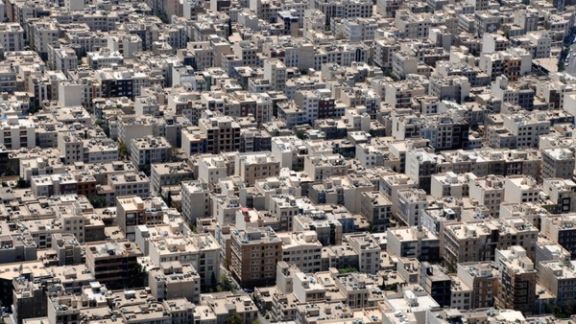
Donyaye Eqtesad released the new data after Tehran's city council members held a meeting with officials of the municipality and experts to mull over a comprehensive plan for the capital, comparing the current indicators about the city with those of 2005. Three major indicators of "quality of life" in Tehran have significantly deteriorated since then, with affordable housing, air pollution and urban decay being the main issues.
Amir Mansouri, a professor at the Faculty of Architecture at the University of Tehran, said during the meeting that "We live in a city where half of the population is in danger of devastating earthquakes, the price per square meter of housing exceeds 600 million rials (approximately $1,300), and ordinary people can no longer afford to buy a home in this city, even renting a place in some neighborhoods has become impossible.” The monthly minimum take-home pay (without benefits) is around $120.
Earlier reports in mid-2022 indicated that there was a more than 300 percent rise in rents in Tehran in a matter of three years. And figures released in December 2021, some six months after Ebrahim Raisi took office as President indicated that food and housing expenses had risen between 300 to 740 percent during the preceding six years while wages went up by around only 270 percent during the same period. A prominent economist, Hossein Raghfar, said earlier this year that high rents in Tehran have pushed many tenants to the less expensive margins of the capital where a new social sub-class is taking shape, with some people having chosen to live in makeshift houses built on some of Tehran's rooftops.
According to a report by reformist daily Shargh earlier this week, the Iranian government has exerted pressure on real estate advertising platforms to keep property prices hidden. The newspaper also noted that for the past eight months, the government has refrained from disclosing housing market data on the official portals of the Iranian Statistical Center and the Central Bank.
Mansouri added that the residents of the capital are exposed to polluted air for more than 200 days a year. Tehran has been logged as the most polluted city in the world for at least several days per year. The capital’s pollution is mainly blamed on poor government policies, desertification and low water levels, as well as climate change that has intensified sandstorms.
Moreover, the usage of highly polluting diesel and mazut fuels in power plants -- instead of natural gas -- jumped in Iran in 2021 on top of increases in previous years. Mazut -- commonly called waste oil -- is a heavy, low quality fuel oil, only used when the facilities to blend or break it down into more conventional petrochemicals such as diesel are not available.
Iran has the world’s second largest natural gas deposits but is unable to boost production because it lacks capital and Western technology. It needs to invest $40 billion in modernizing and expanding its gas fields, but most are in the Persian Gulf and need Western technology. Due to its anti-West foreign policy and an expanding nuclear program, Iran is under US sanctions and cannot borrow money or technology from the West.
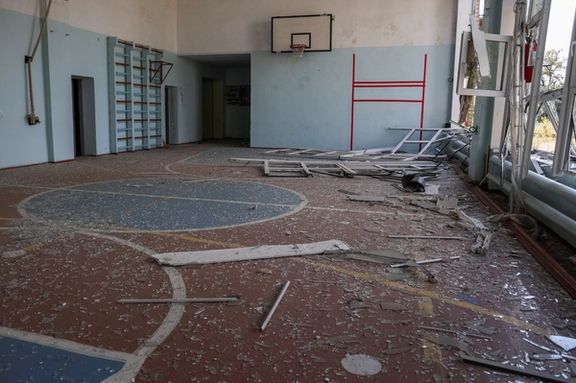
Russia launched 25 Iranian kamikaze drones on the southern parts of the Odesa region on Sunday, where Ukraine has its crucial grain export Danube ports.
The Danube has become Ukraine's main route for exporting grain since July, when Russia quit a UN and Turkey-brokered deal that had given safe passage to Kyiv's exports of grains, oilseeds and vegetables oils via the Black Sea.
Sunday's attack took place the day before Russian President Vladimir Putin and his Turkish counterpart Tayyip Erdogan are due to hold talks in the Russian Black Sea resort of Sochi. Turkey has been pressing to revive the grain deal.
Ukraine's South Military Command said on social media that at least two civilians were injured in the early morning attack on what it called "civil infrastructure of the Danube".
The Ukrainian Air Force said air defence systems shot down 22 of the 25 Iranian-made Shahed drones launched by Russia.
Iran has been supplying hundreds of its Shahed drones to Russia since mid-2022 but denies there were delivered to be used for attacks on Ukraine. The Western alliance supporting Ukraine has imposed sanctions on individuals and companies involved in supplying the drones.
The military said a fire that resulted from the attack at one facility was quickly extinguished.
The Russian Defense Ministry was quoted by Interfax as saying that a group of Russian drones successfully struck fuel depots at the Reni port used by the Ukrainian military.
"Russian terrorists continue to attack port infrastructure in the hope of provoking a food crisis and famine in the world," the Ukrainian president's chief of staff Andriy Yermak wrote on Telegram.
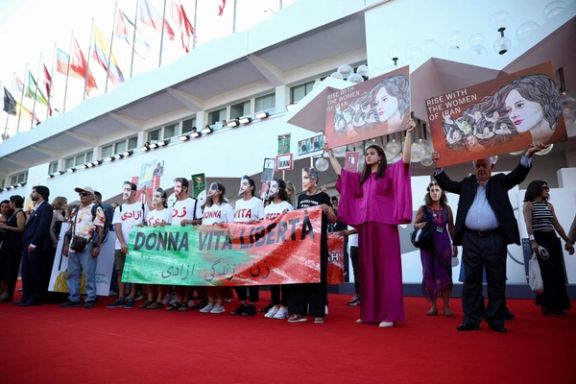
A movie about the Islamic Republic’s pressures on Iranian athletes not to face Israeli competitors is the first production co-directed by Iranian and Israeli filmmakers.
The film, which premiered at the Venice Film Festival, had to be shot in secret to prevent possible interference by Tehran, directors Zar Amir Ebrahimi and Guy Nattiv told Reuters on Sunday.
"Tatami", a tense thriller centered on a world judo championship, received a standing ovation during its premier at the weekend. The film takes place over the course of the single day of competition as an Iranian judoka champion, played by Farsi-speaking US actress Arienne Mandi, is ordered to fake an injury to avoid a possible match-up with an Israeli competitor, a scenario that has happened to several Iranian athletes in real life.
Amir Ebrahimi and Nattiv shot the movie in Georgia, a country Iranians can easily visit. They stayed in separate hotels, spoke English and did not let on that they were making such a politically charged film.
"I knew there are many Iranians there, so we were trying to keep it calm and secret," said Amir Ebrahimi, who is an award-winning actress who fled Iran in 2008.
Iran does not recognize Israel's right to exist and has forced athletes into intentionally losing matches, forfeiting games, or claiming injuries to evade encounters with Israeli competitors.
banned its athletes from competing against Israelis in an incident that inspired "Tatami", the International Judo Federation in 2021 gave Iran a four-year ban for pressuring one of its fighters not to face an Israeli.
Last week, a weightlifter was banned from the sport for life after posing for a photograph with an Israeli at the World Master Championships in Poland.
Over the past few years, approximately 30 Iranian athletes have defected from national teams and sought asylum in foreign nations.






